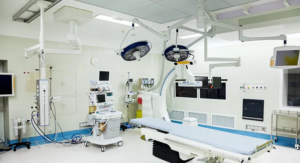The HVAC (Heating, Ventilation, and Air Conditioning) system is of paramount importance in the pharmaceutical industry due to its critical role in maintaining the stringent environmental conditions necessary for the production, storage, and research of pharmaceutical products. Here’s a detailed explanation of the importance of HVAC systems in the pharmaceutical industry:

1. Maintaining Product Quality and Stability
a. Temperature Control
- Pharmaceuticals are often sensitive to temperature fluctuations. Proper temperature control ensures that products remain stable and effective throughout their shelf life.
- HVAC systems provide consistent temperature regulation to prevent degradation of active pharmaceutical ingredients (APIs) and finished products.
b. Humidity Control
- Humidity can affect the chemical stability of pharmaceutical products. Excessive moisture can lead to hydrolysis or promote microbial growth.
- HVAC systems regulate humidity levels to maintain the required moisture content, ensuring product integrity.
2. Contamination Control
a. Air Quality Management
- HVAC systems control airborne contaminants such as dust, microorganisms, and chemical vapors.
- Use of High-Efficiency Particulate Air (HEPA) filters removes particles as small as 0.3 microns, essential for maintaining cleanroom standards.
b. Airflow Patterns
- Laminar Flow: Unidirectional airflow minimizes turbulence and reduces the risk of cross-contamination in cleanrooms.
- Turbulent Flow: Used in less critical areas, still ensures adequate air mixing and contaminant dilution.
c. Pressure Differentials
- Positive pressure in clean areas prevents ingress of contaminants from adjacent less clean areas.
- Negative pressure in areas handling hazardous substances prevents their escape into other parts of the facility.
3. Compliance with Regulatory Standards
a. Good Manufacturing Practices (GMP)
- GMP guidelines require strict control over environmental conditions to ensure product safety and efficacy.
- HVAC systems must be designed, operated, and maintained in compliance with GMP standards, involving rigorous validation and documentation.
b. Regulatory Requirements
- Regulatory bodies like the FDA, EMA, and WHO have specific requirements for environmental control in pharmaceutical facilities.
- Compliance with these requirements is essential to avoid regulatory actions, such as product recalls or plant shutdowns.
4. Ensuring Personnel Safety and Comfort
a. Safe Working Environment
- HVAC systems maintain a comfortable and safe working environment for personnel, which is crucial for productivity and compliance with occupational health and safety regulations.
- Proper ventilation ensures that harmful fumes and contaminants are effectively removed from work areas.
b. Controlled Environments
- Specially controlled environments such as biosafety labs require HVAC systems to manage specific air change rates and filtration to protect both personnel and the external environment from exposure to hazardous materials.
5. Operational Efficiency and Reliability
a. Consistent Performance
- Reliable HVAC systems ensure uninterrupted environmental control, which is critical for continuous manufacturing processes.
- Redundancy and backup systems prevent downtime and potential product loss due to environmental excursions.
b. Energy Efficiency
- Modern HVAC systems are designed to be energy efficient, reducing operational costs while maintaining the necessary environmental controls.
- Energy recovery systems and variable frequency drives (VFDs) are examples of technologies used to enhance energy efficiency.
6. Adaptability and Scalability
a. Flexible Design
- HVAC systems in pharmaceutical facilities are designed to be adaptable to changing regulatory requirements and manufacturing processes.
- Modular and scalable HVAC designs allow for easy expansion or reconfiguration as needed.
7. Validation and Monitoring
a. Validation Process
- HVAC systems undergo rigorous validation processes, including Installation Qualification (IQ), Operational Qualification (OQ), and Performance Qualification (PQ).
- This ensures that the systems perform as intended and comply with regulatory standards.
b. Continuous Monitoring
- Building Management Systems (BMS) or Environmental Monitoring Systems (EMS) continuously track HVAC performance, including temperature, humidity, airflow, and pressure differentials.
- Real-time monitoring and alarm systems help detect and address any deviations promptly, ensuring continuous compliance and product safety.
Summary
The HVAC system is integral to the pharmaceutical industry, playing a vital role in maintaining product quality, ensuring contamination control, complying with regulatory standards, safeguarding personnel, and optimizing operational efficiency. Proper design, implementation, and maintenance of HVAC systems are essential for the successful and compliant operation of pharmaceutical manufacturing and research facilities.
Looking to install a commercial HVAC System or Duct work in your Business Area?
Contact Vipul Ac to learn about our HVAC Service
Call +91 9825636606 Today.
